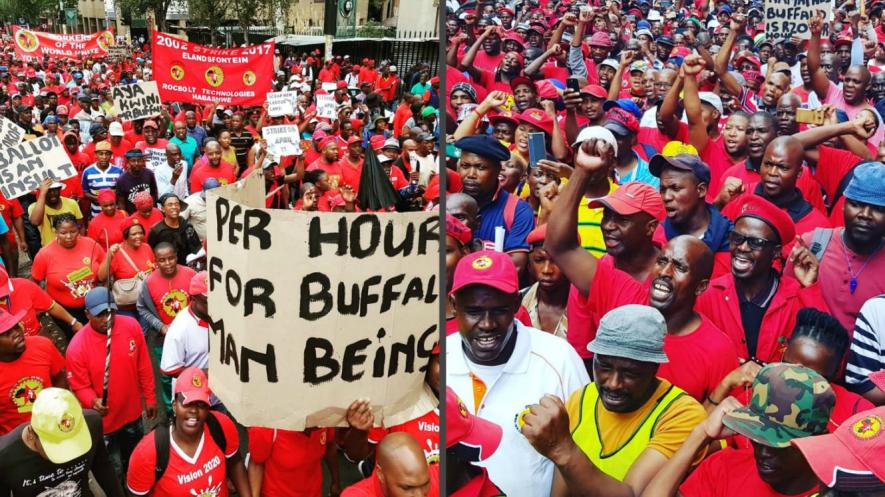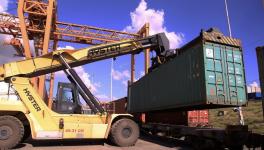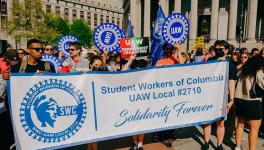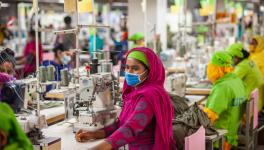Why are South African Plastics Sector Workers on Strike?

Workers employed in the plastics workers protesting against low wages and deteriorating work condition.(Photo: eNews Channel Africa)
The National Union of Metalworkers of South Africa (NUMSA) successfully led a court battle in the Johannesburg Labour Court securing the rights of the nation’s plastics sector workers to strike. Employers in the sector had been attempting to obtain a court order banning the ongoing national strike in face of falling production and profits. This, according to NUMSA, is the first victory in a long battle which they are determined to continue until the workers’ demands are met.
The union has been actively leading the fight against erosion of rights of the country’s plastics sector workers, including attempts to reduce their wages. They have been on a strike since October 15, having successfully consolidated participants from across the country in a National #PlasticsShutdown. At least 10,000 workers are participating in the strike, affecting operations of at least 450 companies in every plastics related sector such as mobile phones, IT, automotive, etc.
On October 16, the union organised a march in Pinetown, a town west of Durban, culminating with the protestors handing over a memorandum of demands to employers in the plastics sector.
Selective implementation of ‘Main Agreement’
The primary demand behind the strike is that the workers in the plastics sector be treated the same as those in other industries. The Main Agreement negotiated between employers and workers in the Metal and Engineering Industries Bargaining Council (MEIBC) in 2014 granted certain rights and benefits to workers in these industries, of which the plastics sector is a part. However, NUMSA notes, employers of this sector are being selective about which MEIBC agreements they follow.
“For instance, they comply with other MEIBC Agreements i.e. the Pension Fund Agreement, Provident Fund Agreement, Sick Pay Fund Agreement and the Dispute Resolution Agreement. But in relation to workers’ wages and benefits, they are spitting on the sacrifices made through the blood, sweat and tears of generations of workers in the industry,” says the press release declaring the strike.
This Main Agreement was effective from 2015 to 2017 and codified workers’ wages and certain employment conditions. NUMSA has been fighting court battles for the extension of this agreement, and is demanding that plastics sector employers support the extension.
The other demands include a 15% wage hike. “In the period 2014-2017, these notorious employers short-changed workers and denied them an increase,” NUMSA says. The union also wants the new MEIBC settlements for 2017-2019 to be extended to the plastics sector.
Deteriorating work conditions
Plastics employers have been particularly determined about securing profits at the cost of workers. The Leave Enhancement Pay, which was serving as bonus pay for workers, has been stopped. Work hours have been increased from 40 hours to 45 hours, without any stipulation for overtime pay. The employers have reduced the leave entitlement of four weeks, removing the fourth week leave for workers who have four years of service. Another significant measure they have taken is categorising pay by area, stipulating that workers in the outlying, non-urban areas will be paid ten percent less than the workers in urban areas, like Johannesburg, Durban and Cape Town.
Instead of hearing out the demands and engaging in a dialogue with the workers, the employers decided to pursue legal action against them. The PCSA, or Plastics Converters of South Africa approached the courts for issuing an order blocking the strike immediately. NUMSA was successful in defending the workers’ right to strike when the Johannesburg Labour Court dismissed the application filed by the employers.
NUMSA in a statement said that it is clear to the workers that the employers are only interested in saving their falling profits, indicated by the decision to resort to legal action against the strike.
Get the latest reports & analysis with people's perspective on Protests, movements & deep analytical videos, discussions of the current affairs in your Telegram app. Subscribe to NewsClick's Telegram channel & get Real-Time updates on stories, as they get published on our website.
























